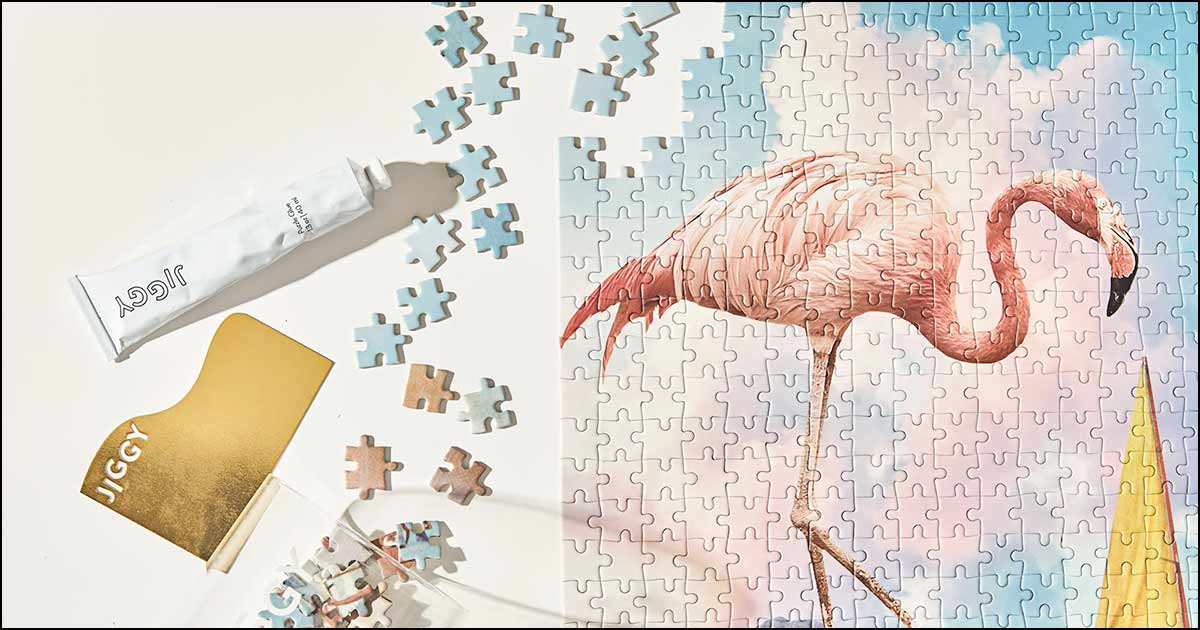The Founder that Turned Her Favorite Hobby Into a Startup
The Origin Story of Ecommerce Startup JIGGY

Last Updated: By TRUiC Team
Most of our jobs are more stressful than we’d like. And while we may enjoy what we do to some extent, if we’re being honest, it’s not what we would choose if we didn’t have to earn a paycheck. But what if we could combine a cherished hobby with a business?
Kaylin Marcotte, founder and CEO of JIGGY Puzzles, did just that. She took her love for jigsaw puzzles and turned it into a full-time occupation, creating a whole new product category along the way. This is the company’s origin story.
From Stress Relief to Company
Marcotte had been working at a stress-inducing startup called theSkimm. It was her first experience at a young company, and the grind was all-consuming. She needed a way to unwind and unplug. Then in 2014, she and her colleagues started to realize they were burned out and had a serious case of tech fatigue. Marcotte decided to make a change. “I wanted to get away from screens and do something with my hands,” she says.
Around the same time, after long days at theSkimm, she had rediscovered her childhood love of jigsaw puzzles. But she wasn’t happy with the selection in toy stores, which “felt really outdated and cheesy – Grandma's puzzles, stock photography, the same cardboard box.” That got her thinking about what her ideal puzzle would look like and how she could innovate on different parts of the puzzle experience. “This was definitely a slow burn of an idea [that] kept coming back to me, kept taking more and more and more shape,” she says. “And ultimately, what I ended up launching in 2019 was JIGGY.”
Partnering With Artists
In a nutshell, JIGGY partners with emerging female artists and turns their artwork into puzzle designs. “Our mission is to get people away from screens, reconnecting with downtime, mindfulness, and then supporting our artist partners [that] we do profit sharing with and get a percentage of every sale,” Marcotte says.
One of her first tasks was to come up with compelling designs, which she spent hours putting together. Then there was the question of what to do with the puzzles once they were finished. Marcotte didn’t just want to tear them apart after all that work, and she figured customers wouldn’t want to, either. The solution: Include special glue with each puzzle so customers can preserve and display them as wall art.
Marcotte acknowledges that she had a steep learning curve as a founder, despite having some transferable knowledge from her time at theSkimm. In particular, she had to learn how to produce a physical product, from manufacturing to fulfillment to customer service. The Covid-19 pandemic and its related supply chain issues didn’t help.
“So it was bootstrapping, trying to do everything in the scrappiest way possible, [which] brought a ton of challenges,” she says. For example, it took almost a year just to create the packaging. “I wanted to reposition puzzles out of the toy-and-game aisle and more into home gifts and lifestyle. And so I wanted the packaging to reflect that because each of the puzzle designs was original artwork by these female artists.” The company also developed its own tool for applying the glue once a puzzle was finished. Add to all this the usual startup tasks like building out a website, and it was a long road.
Having grown up in artsy Los Angeles with a mother who worked in arts education, Marcotte’s favorite part of the business is developing relationships with artists. She knows how hard it is for artists to monetize their work, even if they’re relatively successful. “I wanted to make sure from the beginning that we had [paying artists properly] really baked into the business model,” she says. “A really special aspect is that relationship between the customer puzzle and the artist, where you have studied every detail of their work. And so there's such an appreciation for the work and an intimacy, because … you feel like part of the creative process with the artists.”
When it comes to personnel, JIGGY has mostly employed part-time workers over its two-plus years of existence. So Marcotte doesn’t yet have much experience in team- and culture-building. “We're actively still defining that and seeing what works and what's the right balance … and what are the potential bottlenecks or holdups, [without] micromanaging,” she says.
Puzzles as a Platform
Any artist can submit their work to JIGGY for consideration. The company offers seasonal curated collections and works with partners and brands on custom puzzles. The newest collection, which is launching in the spring of 2022, was the result of our first community art voting contest. More than 500 artists submitted their work, and the local community of puzzle aficionados voted for their favorites.
JIGGY is also developing its “puzzles as a platform” initiative, which uses puzzles as a vehicle for brand launches, product launches, employee gifting, and other business-related activities. The goal is to “create a ritual and habit around puzzles that will continue the demand.”
Other opportunities include partnering with large wholesale and retail partners on puzzle-related projects and working with musical artists on album releases, with the album’s artwork serving as the basis for a custom puzzle. Advertising is another promising avenue; in a world where companies pay millions for 30 seconds of commercial air time, who wouldn’t want their logo on a puzzle that people spend hours putting together?
If JIGGY sounds intriguing, you can follow the company on social media and send artist suggestions. Of course, you can also buy a puzzle. “If you're looking for something to unwind or have a puzzle lover in your life, that would mean the world to us,” she says.
Next Steps:
- Check out JIGGY’s company profile, insights for aspiring entrepreneurs, and ways to support them!
- Hear startup stories from real founders on the Startup Savants podcast.
- Keep up with more startup companies by visiting our list of the top startups to watch.
- Form your own startup by reading our review of the best online incorporation services.
Tell Us Your Startup Story
Are you a startup founder and want to share your entrepreneurial journey with our readers? Click below to contact us today!


